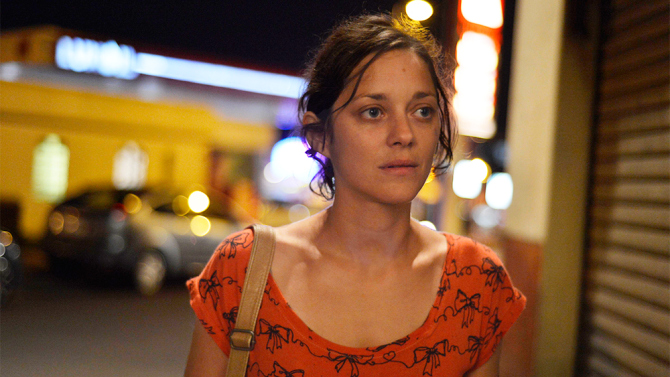Marion Cotillard’s on screen presence dictates the film’s dramatic power
Director: Jean Pierre Dardenne, Luc Dardenne
Cast: Marion Cotillard, Fabrizio Rongione
Rating: 15
Running time: 95 mins
No one does bleak social realism like French speaking filmmakers. Even British kitchen sink drama prioritises social and political commentary, allowing for the occasional quirky, comical scene of reprieve. In contrast, French-speaking realism is fundamentally depressive. It’s all-consumed by a tradition of cosmic pessimism permeating the literary and philosophical lineage of the 20th century: life is tough and at times unbearable.
TWO DAYS, ONE NIGHT is no exception. It’s a realist film, shot in a loose held style, more commonly associated with documentaries. The story is simple and episodic. Sandra (Marion Cotillard), mother, wife, and factory worker, is told she is being made unemployed after her co-workers were given an ultimatum between a 1000 euro bonus or her staying employed. Because she finds out her line manager influenced their decision, she pushes for a re-cast of the vote by pleading with the powers-that-be.
The film follows Sandra as she contacts the employees one-by-one; in order to convince them her staying employed is more important than bonuses. The straightforward plot gives the actors space to manoeuvre and emote regarding their decision to keep the bonus or aid Sandra is her cause. The episodic rhythm makes for arresting, affecting cinema. The audience’s empathy is triggered by the intimacy of Sandra’s point-of-view, as she experiences a rollercoaster of emotion, endangering her very will to live.
Cotillard’s ability to cover the emotional dimensions of an aggrieved woman on the edge, grants the viewer a rare chance to witness a superior actress at the height of her powers. She is, quite simply, breath taking, utterly convincing as someone teetering around the maw of mental collapse. Interestingly, her character grows during the course of the film. At first, she suffers what Jean-Paul Sartre would call ‘bad faith’: she believes her work role defines her very existence, and without it she’d be empty space. As the film progresses, her sense of shame dominates her thoughts. The pity her workmates express outweighs any perceived loss of self. Eventually, it’s the exposure to people’s kindness, rejection, and travails, which reawakens her desire to live. She realises work is necessary, but the job is contingent.
An interesting dynamic – a multi-tiered game theory situation – plays out when the employees begin to vote for or against Sandra. With the vote split down the middle, an increasing number of voters ask how many people have voted for her and who. It’s clear that more is at stake than the bonus for the employees. If Sandra gets her job back, positive voter will gain moral currency and affect the social pecking order of the factory, whereas negative votes and responses will lead to potential black listing.
After almost taking her own life, Sandra refuses to accept a job offer from her CEO once she discovers someone at the plant will lose their job at her expense. Because of the precarious gravity of her experience, she wishes a similar fate on no one. Sandra’s reaction is not surprising because the audience learns – during the course of the film – she is a kind, empathetic person, making her downfall all the more heart breaking.
TWO DAYS, ONE NIGHT is a simple yet effective tale of hardship. It deftly captures a prism of human responses to a person in genuine trouble. The directors take backseats, and Marion Cotillard’s on screen presence is left to dictate the film’s dramatic power. Dark and hard hitting, the film manages to inject slivers of humanistic hope in its final act, in a way only the French-speaking film industry can.
Verdict





























